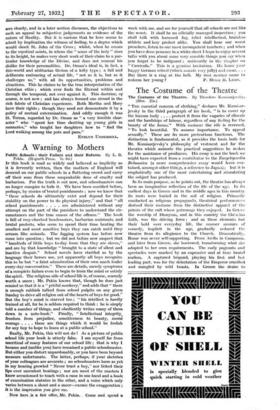A Warning to Mothers
Public Schools : their Failure and their Reform. By L. B. Pekin. (Hogarth Press. 7s. 6d.) Iv this book is read as widely and believed as implicity as it is fervently written, then the mothers of England will descend on our public schools in a fluttering crowd and carry off their sons from these unspeakable dens of cruelty and barbarism. For the truth is out now, and schoolmasters can no longer conspire to hide it. We have been scarified before, perhaps, by stories of brutal punishments ; now we know that " these schools do ultimately exist and depend for their stability on the power to do physical injury," and that " all school punishments . . . . are administered without any attempt on the part of the punishers to understand the cir- cumstances and the true causes of the offence." The book is full of rosy-checked headmasters, barbarian assistants, and brutal prefects, who seem to spend their time beating the smallest and most sensitive boys they can catch until they scream like animals. The fagging system has before now come into question ; but we did not before now suspect that "hundreds of little boys to-day know that they are skives," and are by that knowledge " brought to a state of silent and inactive despair." School novels have startled us by the language their heroes use, yet apparently all boys recognize this to be but " a faint adumbration of their own much fouler every-day conversation." These are details, merely symptoms of a complete failure even to begin to train the mind or satisfy the spirit. The religious side of school life is, of course, scarcely worth a sneer ; Mr. Pekin knows that, though he does just remind us that it is a " pitiful mockery," and adds that " there is enough rubbish talked from school pulpits on any given Sunday to drive all religion out of the hearts of boys for good.' But the boy's mind is starved too ; " his intellect is hardly trained at all, for he is seldom required to think : he is simply told a number of things, and obediently writes many of them down in a note-book?' Finally, " Intellectual integrity, freedom from prejudice, sensitiveness to beauty, moral courage . . . . these are things which it would be foolish for any boy to hope to learn at a public school."
Really, Mr. Pekin, this will not do f As a picture of public school life your book is utterly false. I am myself far from uncritical of many features of our school life ; that is why I became and (unlike you) have remained a public schoolmaster. But either you distort unpardonably, or you have been beyond measure unfortunate. The latter, perhaps, if your sketches of your colleagues are accurate ; no schoolmasters have as yet in my hearing growled " Never trust a boy," nor licked their lips over succulent beatings ; nor are most of the masters I know accustomed to teach with a cane in one hand and a book of examination statutes in the other, and a voice which only Varies between a shout and a sneer—excuse the exaggeration ; it is the impression you give me.
Now here is a fair offer, Mr. Pekin. Come and spend a
week with me, and see for yourself that all schools are not like the worst. It shall be no officially managed inspection ; you shall talk with harassed fag, rebel intellectual, brainless athlete and lazy prefect alike. You shall hear our worst preachers, listen to our most incompetent teachers ; and when you have done penance in a white sheet I hope to enjoy several talks with you about some very sensible things you say when you forget to be indignant ; noticeably in the chapter on " Curricula." This is a genuine invitation. .Do leave your happy German school (which sounds very jolly) and come. . - • But there is a ring at the bell. My first mother come to


































 Previous page
Previous page